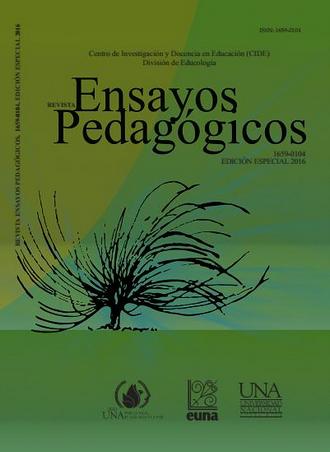The Adventurous in Digital Space: From the Typewriter to E-Mail
DOI:
https://doi.org/10.15359/rep.esp-16.6Keywords:
ICT, Internet, email, literacy, studentsAbstract
In this study, we analyzed the history of the first contact of a group of graduate students in Barcelona, Spain, with Information and Communication Technologies (ICT) which includes the typewriter, computer, the Internet, and email. Data provided in this research were collected through interviews designed to recover information regarding: the student’s first experience with computers, the mechanisms used to learn how to use them, whether they learnt by themselves or were guided by an instructor, and the student’s age at the beginning of this process. We also were interested in understanding the learning process with email accounts: the first time students opened their accounts, whether students received or not assistance, and how did they find out what an email account was. Finally, we recovered their opinions about the ICT.
References
Barton, D., y Hamilton, M. (1998). Literacy practices. En D. Barton, M. Hamilton, y R. Ivanic. (Eds.), Situated literacies. Reading and Writing in Context (7-15). Londres: Routledge.
Barton, D., y Hamilton, M. (2004). La literacidad entendida como práctica social. En V. Zavala,
M. Niño-Murcia, y P. Ames (Eds.), Escritura y sociedad. Nuevas perspectivas teóricas y etnográficas (109-139). Perú: Red para el desarrollo de las ciencias sociales en el Perú.
Camitta, M. (1993). Vernacular writing: varieties of literacy among Philadelphia High School Students. En B. Street (Ed.), Cross-cultural approaches to literacy (228-246). New York: Cambridge University Press.
Gee, J. (1990). Social linguistics and literacies. New York: The Falmer Press.
Gee, J. (1999). The New Literacy Studies and the ”Social Turn”. Recuperado de: http://eric.ed.gov/ERICWebPortal/search/detailmini.jsp?_nfpb=true&_&ERICExtSearch_SearchValue_0=ED442118&ERICExtSearch_SearchType_0=no&accno=ED442118
Gee, J. (2000). The New Literacy Studies. From ‘socially situated’ to the work of the social. En
D. Barton, M. Hamilton, y R. Ivanic (Eds.), Situated literacies. Reading and Writing in Context (180-196), Nova York: Routledge.
Heath, S. (1983). Ways with words: Language, life and work in communities and classrooms. Cambridge: Cambridge University Press.
Kalman, J. (1999). Writing on the Plaza: mediated literacy practices among scribes and clients in Mexico city. Cresskill: Hampton Press.
Kalman, J. (2004). Saber lo que es la letra: Una experiencia de lectoescritura con mujeres mixquic. Biblioteca para la actualización del maestro. México: SEP - Siglo XXI.
Kress, G. (2003). Literacy in the New Media Age. Londres: Routledge.
Lankshear, C., Gee, P., Knobel, M., y Searle, C. (1997). Changing Literacies. Great Britain: Open University Press.
Scribner, S., y Cole, M. (1981). The Psychology of Literacy. Cambridge: Harvard University Press.
Street, B. (1984). Literacy in theory and practice. Cambridge: Cambridge University Press.
Street, B. (1993). Cross cultural approaches to literacy. Cambridge: Cambridge University Press.
Street, B. (1995). Social literacies: critical approaches to literacy development, ethnography and education. New York: Longman.
Downloads
Published
How to Cite
Issue
Section
License
Ensayos Pedagógicos is subscribed to the Attribution-NonCommertial-NoDerivatives 4.0 International Creative Commons Licence, which allows both authors and readers to freely download, store, copy, and distribute the final approved publisehd version of the manuscript (post-print) as long as this is done without commercial purposes, no derivative works are generated, and the source and author are mentioned. As well, Ensayos Pedagógicos declares that authors will remain the rightful owners of the copyrights of their work in perpetuity.







